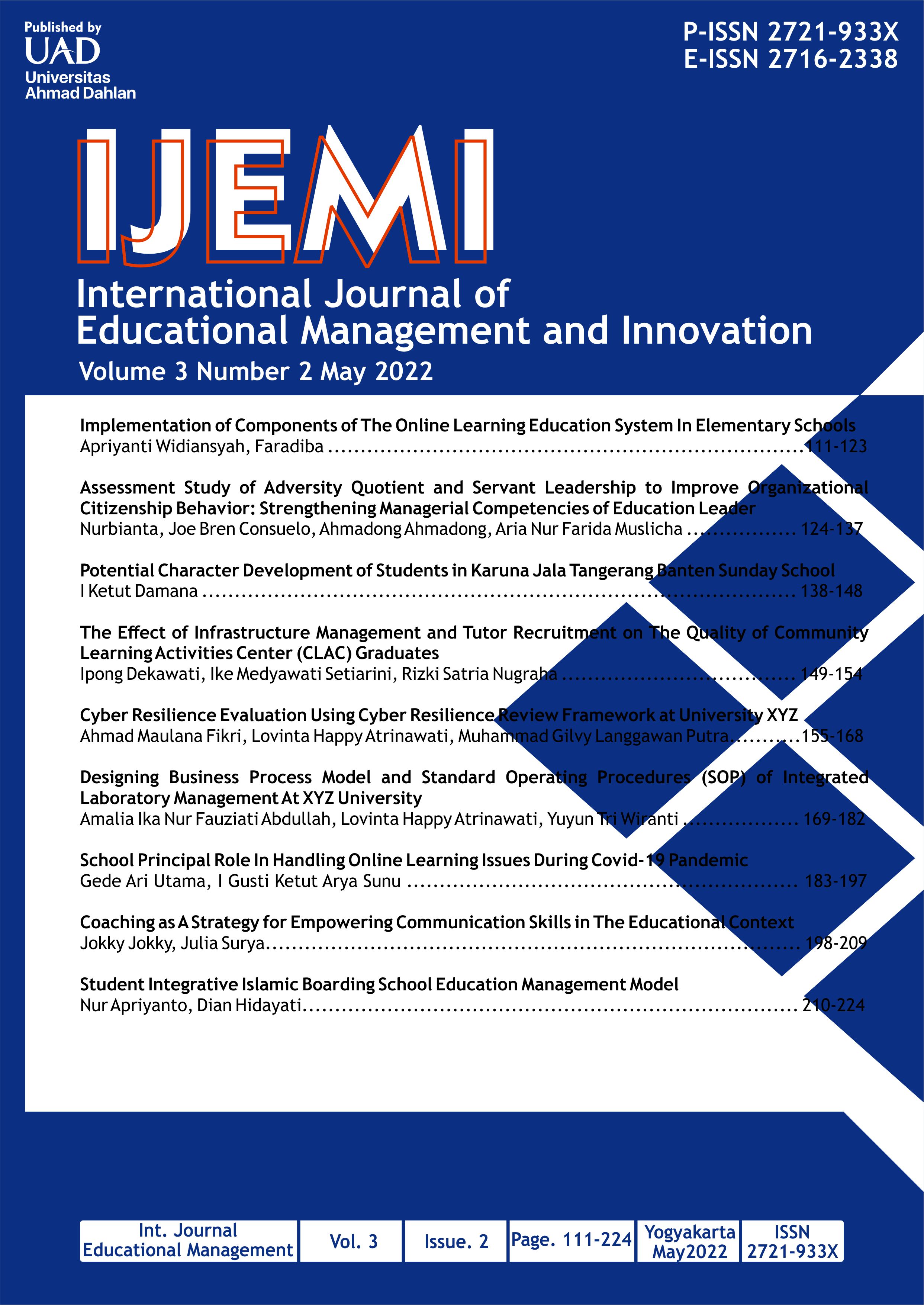Potential Character Development of Students in Karuna Jala Tangerang Banten Sunday School
DOI:
https://doi.org/10.12928/ijemi.v3i2.5791Keywords:
Development, Student's Character, PotentialAbstract
Objectives The potential for character development in Sunday school is motivated by changes in student behavior. The study tries to examine the results of the potential development of students' character. This study uses a qualitative method with a pragmatic approach. The data collection of this study wasdone through documentation and interviews with Miles andHuberman models. This study showed that, Appreciating theteacher's attitude toward the potential of character building of Buddhist Sunday school in Karuna Jala in Tangerang Banten. Supporting factors in applying the potential of character building. Challenges of the potential character building of Buddhist Sunday school. They were organizing the potential formation of the character of Buddhist Sunday school in Tangerang Jala sack monastery. Therefore, learners andteachers should be able to use the character's potential.
References
Aggabalo, Bhikkhu. (2007). Dhammapada Atthakatha. Jakarta: Perpustakaan Narada.
Ahmad. (2010). Pengantar Psikologi. Jakarta: Erlangga.
Alzamil, Z. S., & Vasarhelyi, M. A. (2019). A new model for effective and efficient open government data. International Journal of Disclosure and Governance, (0123456789). https://doi.org/10.1057/s41310-019-00066-w
Anderson dan Krathwol. (2010). Karakteristis Kerangka Landasan untuk Pembelajaran, pengajaran dan Asesmen (Revisi Taksonomi Pendidikan Bloom). Terjemahan Agung Prihantoro. Yogyakarta: Pustaka Pelajar.
Arends,Richard I. (2008). Learning to Teach, Belajar untuk Mengajar Karakter. Terjemahan
Arikunto, Suharsimi, & Lia Yuliana, (2008). Manajemen Pendidikan. Yogyakarta: Aditya
Atkinson et al. (2008). Introduction To PsychologyCharacter. Terjemahan Nurdjannah
Azwar, Saifudin (2010). Sikap Manusia Teori dan Pengukurannya. Yogyakarta: Pustaka Pelajar.
Badan Standar Nasional Pendidikan. 2006. Standar Isi untuk Satuan Pendidikan Dasar dan Menengah: Standar Kompetensi dan Kompetensi Dasar SMA/MA. Jakarta: Badan Standar Nasional Pendidikan.
Chatfield, A. T., & Reddick, C. G. (2017). A longitudinal cross-sector analysis of open data portal service capability: The case of Australian local governments. Government Information Quarterly, 34(2), 231–243. https://doi.org/10.1016/j.giq.2017.02.004
Hanbal, R. D., & Prakash, A. (2019). A rights-based approach to open government data. ACM International Conference Proceeding Series, 1–4. https://doi.org/10.1145/3287098.3287148
Helly Panjitno Soejipto dan Sri Mulyantini Soejipto( 2009). Karakter Psikologi Anak.Yogyakarta: Pustaka Belajar.
Indah (2021). Informan, Guru Sekolah Minggu pada Potential Character Development Of Students In Karuna Jala Tangerang Banten Sunday School
Indun 2021 Informan, Guru Sekolah Minggu pada Potential Character Development Of Students In Karuna Jala Tangerang Banten Sunday School
Ira (2021). Informan, Guru Sekolah Minggu pada Potential Character Development Of Students In Karuna Jala Tangerang Banten Sunday School
Ita. (202)1. Informan, Guru sekolah minggu Potential Character Development Of Students In Karuna Jala Tangerang Banten Sunday School
Jane Ritchie, J. L. (2003). Qualitative Research Practice. In Journal of Social Intervention: Theory and Practice. https://doi.org/10.18352/jsi.39
Lassinantti, J., Ståhlbröst, A., & Runardotter, M. (2019). Relevant social groups for open data use and engagement. Government Information Quarterly, 36(1), 98–111. https://doi.org/10.1016/j.giq.2018.11.001
Maleong. Lexy J. (2007). Metodologi Penelitian Kualitatif. Edisi Revisi. Bnadung PT Remaja Rosdakarya
Muclas. (2012). Character Psikologi Umum. Jakarta: Rineka Cipta.
Sartori, Giovanni, (2005). Parties and Party Systems: A Framework for Analysis
Sugiyono (2018). Metode Penelitian Kuantitatif, kualitatif, dan R&D Bandung Alfabeta
Sugiyono, (2008). Memahami Penelitian Kualitatif.Bandung: Alfabeta
Sugiyono, (2016). Metode Penelitian Pendidikan. Bandung. Alfabeta
Winton (2010). Ehipassiko Foundation Pelajaran Karakter Agama Buddha. Jakarta: Dhamma Citta Press
Downloads
Published
How to Cite
Issue
Section
License
Copyright (c) 2022 Universitas Ahmad Dahlan

This work is licensed under a Creative Commons Attribution-ShareAlike 4.0 International License.
The copyright to this article is transferred to Universitas Ahmad Dahlan (UAD) if and when the article is accepted for publication. The undersigned hereby transfers any rights in and to the paper including without limitation all copyrights to UAD. The undersigned hereby represents and warrants that the paper is original and that he/she is the author of the paper, except for material that is identified as to its source, with permission notices from the copyright owners where required. The undersigned represents that he/she has the power and authority to make and execute this assignment.
We declare that:
This paper has not been published in the same form elsewhere.
It will not be submitted anywhere else for publication before acceptance/rejection by this Journal.
Copyright permission is obtained for materials published elsewhere and which require this permission for reproduction.
Furthermore, I/We hereby transfer the unlimited rights of publication of the above-mentioned paper in whole to UAD. The copyright transfer covers the exclusive right to reproduce and distribute the article, including reprints, translations, photographic reproductions, microform, electronic form (offline, online), or any other reproductions of similar nature.
The corresponding author signs for and accepts responsibility for releasing this material on behalf of any and all co-authors. This agreement is to be signed by at least one of the authors who have obtained the assent of the co-author(s) where applicable. After submission of this agreement signed by the corresponding author, changes of authorship or in the order of the authors listed will not be accepted.
Retained Rights/Terms and Conditions
Authors retain all proprietary rights in any process, procedure, or article of manufacture described in the Work.
Authors may reproduce or authorize others to reproduce the Work or derivative works for the authors' personal use or for company use, provided that the source and the UAD copyright notice are indicated, the copies are not used in any way that implies UAD endorsement of a product or service of any employer, and the copies themselves are not offered for sale.
Although authors are permitted to re-use all or portions of the Work in other works, this does not include granting third-party requests for reprinting, republishing, or other types of re-use.




